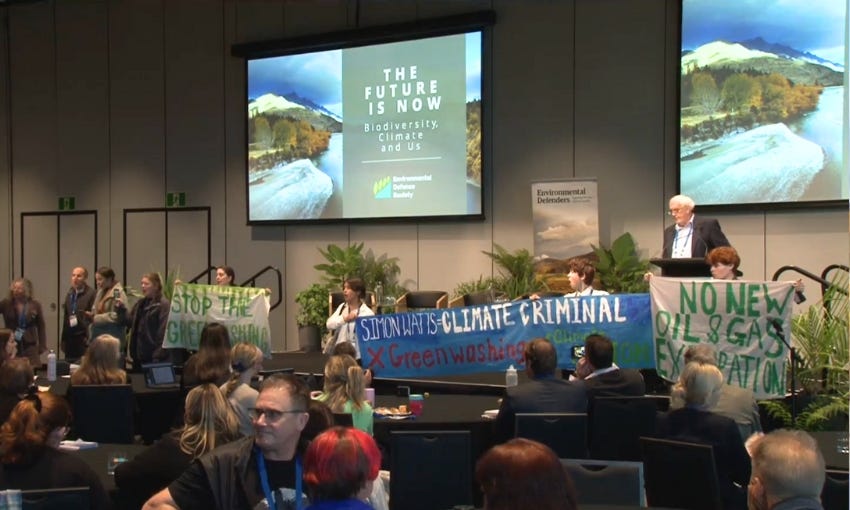The environmental protest movement ramps up
School Strike 4 Climate gatecrashes the climate change minister’s speech, while agriculture gets a reprieve from emissions pricing.
Kia ora, welcome to Future Proof. Thanks for joining me! This week: an iconic Earth selfie, and the UN chief calls for an end to fossil fuel advertising. But first: the environmental protest movement picks up steam.
Protestors at the Environmental Defence Society conference crash the climate change minister’s session on climate policy.
The minister for climate change, Simon Watts, began his address at the Environmental Defence Society (EDS) conference by reiterating the coalition government’s “commitment to climate change”. “This government is committed to meeting our targets to reduce the impacts of climate change, and prepare for its future effects,” he said.
But a few minutes into his spiel, an interruption: “Simon, do you think anyone here is buying your greenwashing bullshit?” someone exclaimed, to a ripple of applause.
Watts attempted to soldier on, but the exclamations kept coming. He abruptly left the stage as protestors unfurled banners labelling him a climate criminal, guilty of greenwashing, and began chanting, “Down with the fast track, Simon Watts, you are sacked.”
School Strike 4 Climate Ōtautahi and Climate Liberation Aotearoa organised the protest, with one participant later stating, “As soon as we started to interrupt his speech, he walked straight off the stage and left the conference like a wimp, proving he has no good response to our great concerns about Papatūānuku and about our futures.”
Climate walk not matching the talk
It would have been interesting to see how Watts might have handled tough questions from the environmentalist audience, given his assurances about the government’s commitment to climate action are not backed up by, well, much action.
For example, the coalition government has announced it will reverse the ban on new offshore oil and gas exploration – despite evidence showing we don’t need any new fossil fuel projects to meet future needs, and that we must actually leave fossil fuels in the ground if we want to limit warming. It’s a decision that could be more fraught than the Fast-track Approvals Bill, writes Marc Daalder on Newsroom.
The government has also announced it will amend the Climate Change Response Act to prevent agriculture – responsible for almost half of New Zealand’s planet-heating emissions – from entering the Emissions Trading Scheme (ETS). This scheme is the coalition government’s primary tool for fighting climate change, Sebastian Gehricke, director of the climate and energy finance group at the University of Otago, points out. “If half our emissions remain outside of the ETS and are not priced, how can this tool impact those emissions at all?”
Gatecrashed conference latest in escalating protests
As one Twitter spectator noted, all it took was the addition of “1 Watt” to “electrify” the EDS conference (I can’t resist a good pun). But even before the conference lectern temporarily became a protest stage, tensions were high with “flickering flames of division”, according to Newsroom’s David Williams, who reported from a pre-conference workshop.
Two days before the conference, more than 20,000 people marched down Queen Street, protesting the Fast-track Approvals Bill. (Shanti Mathias has a helpful explainer on the bill, and why it has folks so riled up.) And now, a New Plymouth oil and gas conference has shifted online due to protestors planning to disrupt the forum.
Fuelled by what environmentalists have dubbed the government’s “war on nature”, they’re all signs of a protest movement potentially firing up.
Join The Spinoff Members
“The Spinoff has given me my faith in good journalism back.” – Anja, Spinoff member since 2020.
If, like Anja, you value our work and want to support us, please consider becoming a member today. Already a member? Ka nui te mihi, your support means the world to us.
Aotearoa is a world leader in ‘ultrawilding’
With high urban tree canopy and flourishing birdlife, Wellington might just be the most “ultrawilded” city in the world, Steve Mushin writes on The Spinoff. Mushin has written a book about rewilding urban areas with the help of technology and engineering, aka ultrawilding. Supercharged by Predator Free 2050, the whole country’s rewilding tech sector is “booming like the kākāpō,” he says.
UN chief calls for ban on fossil fuel advertising
Last week, UN secretary general António Guterres said that advertising of climate-polluting coal, oil and gas should be banned, in the same way tobacco advertising was banned because of health threats. “Many in the fossil fuel industry have shamelessly greenwashed even as they have sought to delay climate action,” he said, while also urging media and tech companies not to accept fossil fuel ads. Following a 2022 ban in France, the movement has grown overseas – but not yet here in New Zealand, writes Matt Halliday, lecturer in brand advertising and creativity at AUT.
Introducing Juggernaut: The Story of the Fourth Labour Government
In a new six-part series, Toby Manhire interviews more than 20 people at the heart of the momentous social, cultural and economic changes that resulted from NZ's pivotal 1984 snap election. Subscribe to make sure you get every episode.
Juggernaut was made with the support of NZ on Air.
More stories
An Indigenous woman, Murrawah Maroochy Johnson of the Birri Gubba Nation in Australia, fought against a coal company and won. Her work has earned her the prestigious Goldman Environmental Prize.
A climate scientist is Mexico’s new president.
Check out this Washington Post interactive exploring what happens when you breathe in microplastics, then read eight practical tips for how to avoid ingesting microplastics.
Every Sunday, the biggest streets of Bogotá close to cars, freeing up space for pedestrians, skaters and cyclists. The weekly ritual of “ciclovía” arose out of a 1974 anti-car protest.
This architecture firm wants to turn skyscrapers into batteries.
A renewable energy transition that doesn’t harm nature is not just possible, but essential, these Aussie researchers argue.
An ancient rātā, that appears to be “walking” across the land, has won New Zealand’s tree of the year competition.
Transport is a key part of reaching our climate goals; here’s what you need to know about Auckland’s $63 billion bid for better transport (and how you can help).
Image credit: NASA.
The astronaut and photographer of the iconic Earthrise photo, Bill Anders, died in a plane crash at the age of 90 last week. Captured on the Apollo 8 mission to the moon, Anders’ striking snap was the first colour image of Earth captured from outer space. It is widely credited with propelling the global environmental movement and leading to the creation of Earth Day. “We came all this way to explore the Moon, and the most important thing that we discovered was the Earth," Anders said.
Astronomically grateful for the Earth we share,
Ellen
Future Proof is looking for a sponsor!
Connect your brand with an insightful exploration of environmental news, reaching influential readers committed to sustainability and staying informed about the state of our natural world. Contact commercial@thespinoff.co.nz to learn more.
Got some feedback about Future Proof or topics you’d like covered? Get in touch with me at futureproof@thespinoff.co.nz











